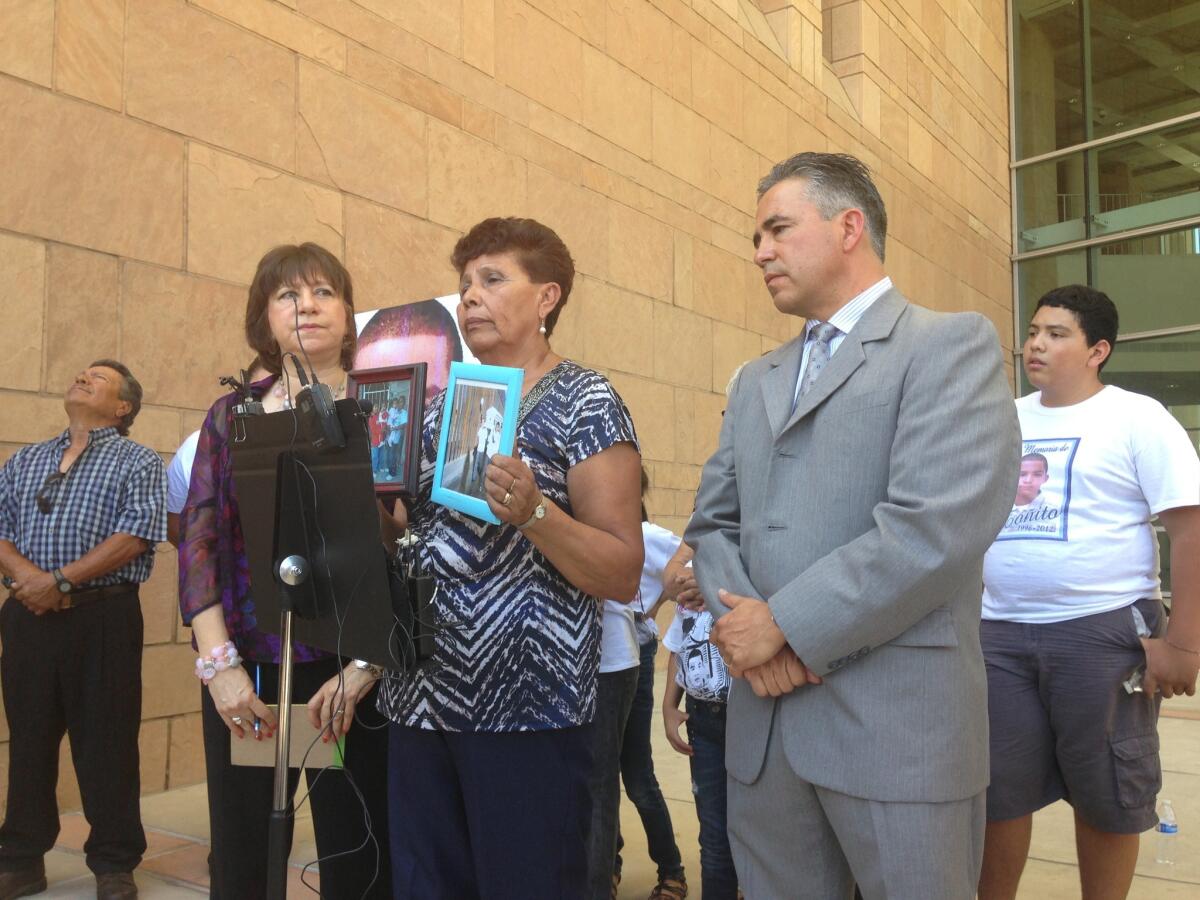Mother suing Border Patrol in Mexico boy’s 2012 death wants answers

- Share via
reporting from Tucson — The mother of a Mexican teenager killed in Mexico when at least one U.S. Border Patrol agent opened fire north of the border has filed suit, alleging that the agent violated the law, her attorneys and the American Civil Liberties Union said Tuesday.
Araceli Rodriguez seeks unspecified monetary and punitive damages for what she contends was the wrongful death of her younger son, who was shot at least eight times in October 2012. Jose Antonio Elena Rodriguez, 16, was walking along a street in his hometown of Nogales, which runs parallel to the border fence.
Rodriguez said she had gotten no answers from the U.S. government.
“I want to know who these people were who assassinated my child. Why were there so many bullets in my son’s body?” Rodriguez said in an interview from Nogales. “Put yourself in my shoes. Imagine if your child were shot 10 times — a child thrown on the floor in a pool of his own blood. And there are no answers. There is no justice.”
U.S. Customs and Border Protection officials have declined to comment, saying the agency does not discuss pending litigation.
Jose died on Oct. 10, 2012, when at least one Border Patrol agent fired through the border fence into Nogales. An autopsy showed he was hit eight times in the back.
The Border Patrol said the agent, whom it has refused to identify, had been hit by rocks when he responded to reports of drug smugglers climbing the fence.
Rodriguez’s lawsuit says Jose was not throwing rocks and that he had just finished a basketball game with friends and was shot as he walked along Calle Internacional, a major boulevard.
U.S. officials launched an investigation but have yet to release the results, including whether the shooting was within agency policy. It’s unclear whether the agent or agents were cleared, disciplined or fired. Nor have the results of a Mexican investigation been released.
The Border Patrol has been criticized for a “lack of diligence” in investigating agents who fire their weapons, a report by independent law enforcement experts found. The review, commissioned by Customs and Border Protection, found that agents are rarely prosecuted, with investigations typically concluding that the agent acted in self-defense. The agency unsuccessfully sought to keep the report secret.
The Rodriguez lawsuit, filed in federal court in Tucson, raises questions about whether U.S. laws protect foreign individuals on foreign soil.
Lee Gelernt, deputy director of the ACLU Immigrants’ Rights Project, said the U.S. can’t have it both ways.
“They want to be able to shoot into Mexican territory and patrol and control Mexican territory with force, but Mexicans then don’t have the legal right to bring the U.S. to court,” Gelernt said.
But an independent legal expert said he doubted that U.S. constitutional protections would apply to Jose.
“I would say they have an uphill battle,” said Aaron Xavier Fellmeth, a professor of law at Arizona State University’s Sandra Day O’Connor College of Law.
Non-U.S. citizens in the United States have most constitutional rights, except those relating to the rights and duties of citizenship, such as the right to vote, he said. Non-U.S. citizens outside the country have a weaker basis for claiming constitutional rights.
“In the distant past, the U.S. Supreme Court decisively denied constitutional protections to aliens outside the United States. In fact, it denied constitutional protections to U.S. citizens outside the United States as well, so aliens didn’t have much of a chance,” Fellmeth said.
But case law indicates that foreigners are afforded U.S. constitutional protections in some instances, Gelernt contends.
For instance, in 2008 the U.S. Supreme Court ruled 5 to 4 that a foreigner held at the Guantanamo Bay naval base in Cuba had the right to challenge his detention in federal court under the U.S. Constitution. The U.S. leases the land and controls the base.
Gelernt argues that the Border Patrol holds similar control over Mexican territory along the U.S.-Mexico border.
The U.S. has taken no action on the mother’s claim, Gelernt said, and the statute of limitations for filing a civil suit was fast approaching.
“Unfortunately, this is the last resort for the family,” he said.
On Tuesday, flanked by family, attorneys and ACLU officials, Taide Elena displayed pictures of her grandson at a news conference in Tucson.
“One of these photographs signifies for me a happy time,” she said, holding a framed photo of a 10-year-old Jose smiling alongside his older brother, Diego.
Then she held up a photo of Jose in a casket, escorted by pallbearers.
“This other one is the pain Border Patrol has left me,” she said. “Jose Antonio was not an animal. He was a child. He was a human being.”
Twitter: @thecindycarcamo
More to Read
Sign up for Essential California
The most important California stories and recommendations in your inbox every morning.
You may occasionally receive promotional content from the Los Angeles Times.














